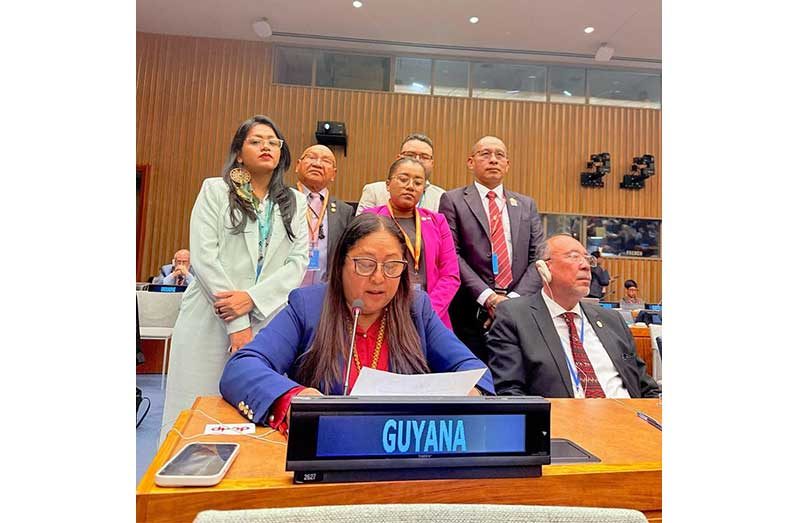highlights progress, challenges in advancing UNDRIP commitments
GUYANA has reaffirmed its position as a regional leader in Indigenous rights, with Minister of Amerindian Affairs, Pauline Sukhai, telling the United Nations Permanent Forum on Indigenous Issues (UNPFII) that the country is actively implementing its declaration on the Rights of Indigenous Peoples (UNDRIP) through inclusive policies, legal safeguards, and land ownership reforms.
Delivering her statement on Day Two of the 24th Session of the Forum, Minister Sukhai said Guyana is “proud of its successes,” pointing to the country’s legislative framework and its strong working relationship with Indigenous communities.
“Full engagement with Indigenous Peoples is a reality in Guyana,” Sukhai told the Forum, adding that “Our Constitution and the Amerindian Act of 2006 provide the legal backbone for this inclusion and remain aligned with the principles of UNDRIP, which Guyana endorsed in 2007.”
She noted that the Government of Guyana facilitates direct participation of Indigenous leaders through the annual National Toshaos’ Council Conference, where elected village leaders engage in dialogue with state officials to influence national policy.
This, alongside continuous village-level outreach by the President and Cabinet, reflects the implementation of the principle of Free, Prior and Informed Consent (FPIC), she said.
Minister Sukhai also highlighted the inclusion of Indigenous Peoples as partners in Guyana’s flagship Low Carbon Development Strategy (LCDS), noting that their endorsement of the plan reflects their critical role in environmental stewardship and climate action, both nationally and internationally.
On land rights, the Minister pointed to the ongoing Amerindian Land Titling Project, executed in partnership with the United Nations Development Programme (UNDP), which seeks to provide legal recognition of Indigenous land ownership in accordance with the Amerindian Act.
Despite misinformation campaigns causing delays, the Minister said that Indigenous Peoples collectively own 16.4 per cent of Guyana’s land mass—making them the second largest landholders in the country.
“The Amerindian Act provides for the right to self-determination,” she said, explaining that Indigenous communities manage their own affairs through legally mandated Village Councils, which are elected by residents.
Minister Sukhai also referenced Guyana’s National Mechanism for Reporting and Follow-up, which monitors and reports on human rights obligations, including those specific to Indigenous communities.
While the State remains responsive to concerns raised, she noted the challenge of some individuals bypassing local mechanisms in favour of external reporting, even where domestic remedies exist.
“We are proud of our successes as we continue to enjoy a strong working relationship with our Indigenous Peoples,” she said.



.jpg)









